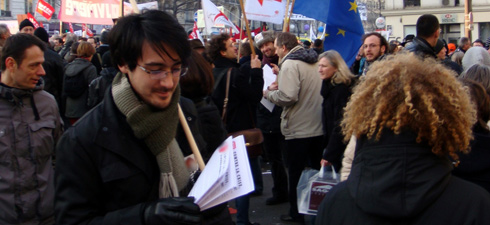Europe has had a directly elected parliament since 1979, and in the 30 years since then its citizens have voted on its composition six times. The seventh elections are coming up in about a fortnight: a mammoth exercise in mass democracy rivalled only by elections in India. The European Parliament is the only transnational, democratically legitimised assembly in the world endowed with a decent measure of clout. In all likelihood, the members of the upcoming seventh legislature will enjoy the privilege of being the first EU representatives to be accorded truly far-reaching powers to steer and control European policy.
Who cares? Precious few, apparently. Europe’s citizens pay their political respects more reluctantly in the European elections than at any other cyclical call to cast their ballots. Even after 30 years of parliament, Europe is, in their eyes, a pseudo-democratic affair for a select few in the political élite.
Not that there’s any dearth of European revivalist preachers. The European think tank directory lists more than 52 organisations striving to whip up Euro-enthusiasm. Political parties and foundations in all 27 member states are pumping huge sums into the information market as though they were hell-bent on forcing the advent of a second Age of Enlightenment.
So now the candidates are beaming down from the posters again, the chancellor and cabinet members are proclaiming the momentous importance of the elections; there’s a little circle-of-stars flag hanging in front of the bakery, and an advertising agency is going to parade naked 20-foot-tall chickens at neighbourhood market-places to call attention to the vital importance of European consumer protection directives.
And all to so little avail. Europe cannot be translated into voter turnout. And as if that weren’t tragic enough as it is, this EP and the EU institutions are under more pressure during the campaign to justify their ongoing existence than, say, FC Bayern Munich’s manager after three straight defeats. That’s why MEPs, EU commissioners, High Representatives – in a word, the whole Euro-political élite – are actually marching around the marketplace like naked chickens, sounding off on the duty to vote, the European mission, the euro and the old long-dismantled checkpoints along the borders. That makes it sound as if all of Europe’s achievements could vanish into thin air at one fell swoop, as though voters had to pledge allegiance to the EU lest the whole house come tumbling down. In these election hours, Europe only exists as either a shimmering, glittering idyll or an undemocratic Moloch. It’s as if Germans had to decide whether to keep their constitution every time Bundestag elections come around again.
After 30 years of parliamentary history, this is a grotesque state of affairs. There are many reasons why it’s so hard to put Europe across to its citizens, but they just don’t want to hear it any more, because it’s not just institutions that have a duty to discharge. There’s a duty to be discharged by the people of Europe too, those voters who must not merely grudgingly accept the system they live in. Europe is an imposition one has to freely impose on oneself.
It would be great if these were the last European elections in which people need to be told why this unique superstate deserves a little more political attention, and why a confederation of 27 relatively small countries is very much to their advantage in a rapidly changing world.
Opinion
Does Europe make you short-sighted?
“To do a good job of representing their national interests in the European Parliament, MEPs should always have a telescope handy to keep an eye on their constituencies when they are in Brussels. At the same time, they also need one to avoid losing sight of what is happening in Europe when they are at home!” According to Horia Roman Patapievici, political scientist and director of the Romanian Cultural Institute, it's not enough for the European Parliament to function efficiently, it must also reach out to voters across the EU. For Patapievici, a low turnout at the European elections is the inevitable consequence of a parliament that is perceived as unable to implement real change. “Abstention is caused by political reasons and not psychological ones. In the emerging democracies of new member states, and also in long-standing democracies, European institutions suffer from a major lack of political credibility,” wrote the Romanian analyst in Evenimentul Zilei. Quoting Professor J.H.H. Weiler of New York University, a specialist in the study of European institutions, he went on to explain that the absence of “a direct relationship between citizens’ votes and the future decisions of the Union” is the cause of “a sense of futility, which demoralises voters and keeps them away from the polls.”
Was this article useful? If so we are delighted!
It is freely available because we believe that the right to free and independent information is essential for democracy. But this right is not guaranteed forever, and independence comes at a cost. We need your support in order to continue publishing independent, multilingual news for all Europeans.
Discover our subscription offers and their exclusive benefits and become a member of our community now!












